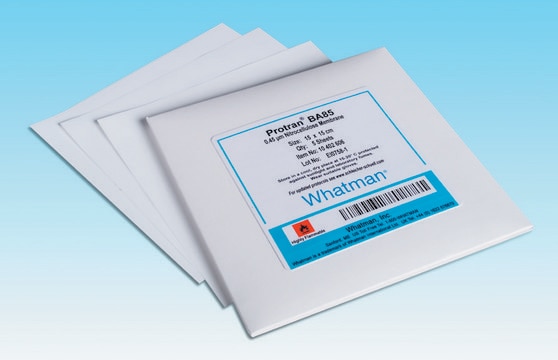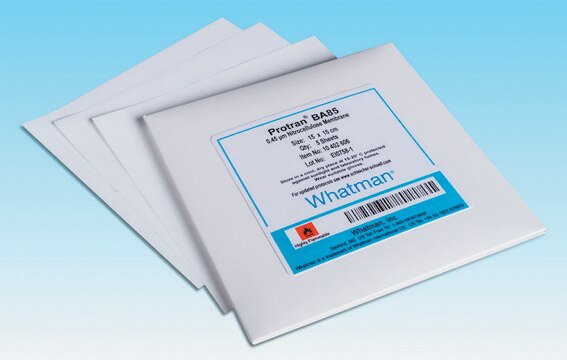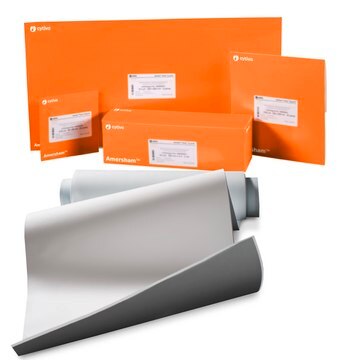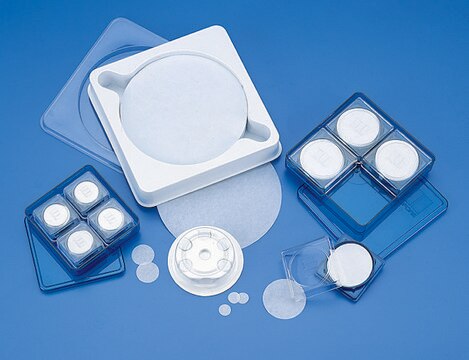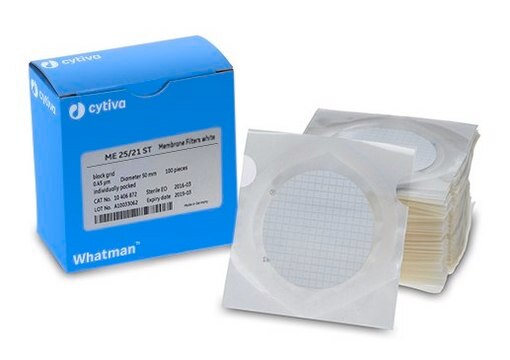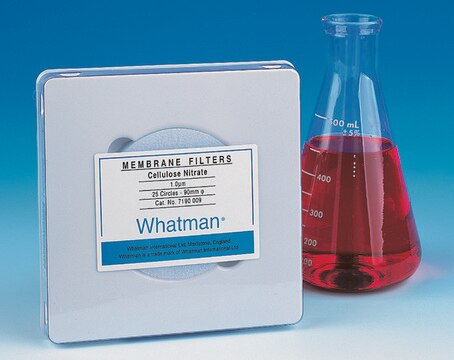WHA7182004
Whatman® Nitrocellulose-Membranfilter
plain white, pore size 0.2 μm, diam. 47 mm
Synonym(e):
Whatman filter, Z745952, membrane filters, syringe filter
About This Item
Empfohlene Produkte
Materialien
plain white
Sterilität
non-sterile
Verpackung
pack of 100 ea
Hersteller/Markenname
Whatman 7182-004
Whatman Article No. 28420735 (US reference)
Durchmesser
47 mm
Porengröße
0.2 μm
Suchen Sie nach ähnlichen Produkten? Aufrufen Leitfaden zum Produktvergleich
Verwandte Kategorien
Allgemeine Beschreibung
Higher strength and flexibility:
Most membranes are inherently brittle and difficult to handle; it is not uncommon for filters to be damaged during loading into holders or while in use. Whatman cellulose nitrate membrane filters have a noticeably improved flexibility and are made to tolerate abuse during handling, loading and autoclaving without sacrificing integrity. These membranes are among the strongest of their type available, as measured and compared by burst pressure tests.
Low extractable levels:
The level of extractables in membrane filters has become more important with advances in filtration or adsorption techniques. In particular, pharmaceutical, immunological and biomedical tissue culture and trace analysis applications can be adversely affected by high extractable levels. Whatman cellulose nitrate membrane filters have a low level of extractables, generally below that of other membranes of a similar type.
Narrow pore size distribution:
One of the major features of Whatman membrane filters is the narrow distribution of pore sizes. The rated pore size of these membranes is closely controlled due to the advanced manufacturing and control system. Additionally, the batch-to-batch variation is minimized providing more consistent laboratory results.
Increased temperature stability:
Membrane filters are normally autoclaved at 121°C without loss of integrity. Cellulose nitrate membranes are supplied as circles, sheets or reels.
Reduced shrinkage:
Excessive shrinkage can cause problems during autoclaving and is often the cause of membranes tearing in their holders after autoclaving. It may also cause a reduction in flow rate and total throughput. Whatman membranes exhibit a low shrinkage during autoclaving.
Applications:
- Sample preparation
- Microbiological studies
- Filtration of aqueous solutions
Sonstige Hinweise
Rechtliche Hinweise
Signalwort
Warning
H-Sätze
P-Sätze
Lagerklassenschlüssel
11 - Combustible Solids
Analysenzertifikate (COA)
Suchen Sie nach Analysenzertifikate (COA), indem Sie die Lot-/Chargennummer des Produkts eingeben. Lot- und Chargennummern sind auf dem Produktetikett hinter den Wörtern ‘Lot’ oder ‘Batch’ (Lot oder Charge) zu finden.
Besitzen Sie dieses Produkt bereits?
In der Dokumentenbibliothek finden Sie die Dokumentation zu den Produkten, die Sie kürzlich erworben haben.
Kunden haben sich ebenfalls angesehen
Unser Team von Wissenschaftlern verfügt über Erfahrung in allen Forschungsbereichen einschließlich Life Science, Materialwissenschaften, chemischer Synthese, Chromatographie, Analytik und vielen mehr..
Setzen Sie sich mit dem technischen Dienst in Verbindung.